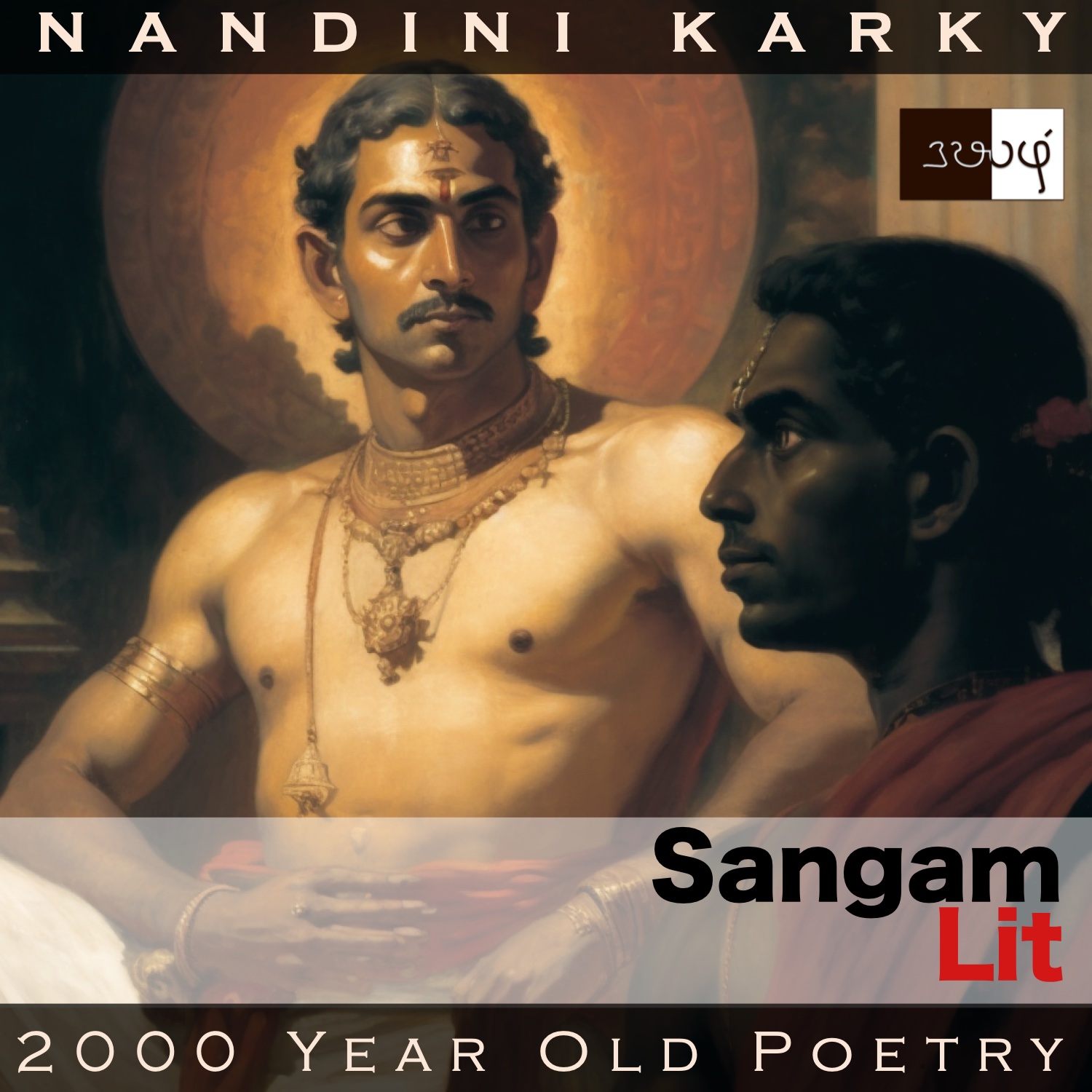Podcast: Play in new window | Download
Subscribe: Apple Podcasts | Spotify | Amazon Music | Android | iHeartRadio | Email | TuneIn | RSS | More
In this episode, we perceive the greatness of this king, as depicted in Sangam Literary work, Puranaanooru 99, penned about the Velir King Athiyamaan Nedumaan Anji by the poet Avvaiyaar. Set in the category of ‘Vaagai Thinai’ or ‘King’s victory’, the verse describes the accolades received by the king.

அமரர்ப் பேணியும், ஆவுதி அருத்தியும்,
அரும் பெறல் மரபின் கரும்பு இவண் தந்தும்,
நீர் அக இருக்கை ஆழி சூட்டிய
தொல் நிலை மரபின் நின் முன்னோர் போல,
ஈகை அம் கழல் கால், இரும் பனம் புடையல்,
பூ ஆர் காவின், புனிற்றுப் புலால் நெடு வேல்,
எழு பொறி நாட்டத்து எழாஅத் தாயம்
வழு இன்று எய்தியும் அமையாய், செரு வேட்டு,
இமிழ் குரல் முரசின் எழுவரொடு முரணிச்
சென்று, அமர் கடந்து, நின் ஆற்றல் தோற்றிய
அன்றும், பாடுநர்க்கு அரியை; இன்றும்
பரணன் பாடினன் மற்கொல் மற்று நீ
முரண் மிகு கோவலூர் நூறி, நின்
அரண் அடு திகிரி ஏந்திய தோளே!
Continuing in this series of songs by Avvaiyaar, we arrive at a special moment in the life of King Athiyamaan. The poet’s words can be translated as follows:
“Worshipping immortals and performing rituals, they came in the rare tradition of bringing sugarcane here. In this world surrounded by water, the wheel of power favoured your ancestors from the ancient tradition. Wearing golden warrior anklets on your feet, a garland of dark palmyra, having flower-filled orchards many and holding tall spears with fresh flesh, you posses the right to rule over seven different countries. Having all this, you still do not rest. Desiring war, as sounds of drums resounded, you went and triumphed over enemies, showcasing your great strength. Yet poets found it rare to sing your praises. But today, Paranan has sung about your discus-wielding, fort-destroying shoulders as you shattered the enemy bastion at Kovaloor!”
Let’s explore the details in this verse. The poet starts by talking about the ancestors of this king, whom she describes as being respectful to the immortals and having the honour of bringing sugarcane to this land. Does that mean those ancestors were the proponents of agriculture in this region long ago or that they imported a particular crop from other regions? A question for history of agriculture enthusiasts! Returning, we see the poet now talking about the appearance of this king, mentioning his warrior anklets, palm garlands and tall spears that still reek of fresh flesh, implying that it never ceases to rest in between its many wars. Not surprisingly, the king seems to have won over seven different countries and brought them under his reign. The poet adds that he was not satisfied with that and went on to win many wars. As a consequence, he was not someone easily accessible to poets. Although they had so much to sing about him, he was never present in court to receive their praises probably. But at last, the great poet, Paranar has sung about the king’s great victory at Kovaloor, the poet concludes.
If we recollect, Paranar is the historian-poet whom we have met in many verses. He always manages to sneak in a snippet of history even in songs about relationships. Intriguing to see the respect one poet commands in the heart of another, for Avvaiyaar, who has sung so many songs on this king, presents it as if it’s a greater honour to be sung by Paranar. Reflecting on how such ambitious, war-seeking attitudes seem to be celebrated, we can only say that people then were the product of their times and it seems as if only such events were considered as great and honourable deeds of a monarch. A moment to feel blessed that we have come far from this war-mongering at the whim of an all-powerful person, although traces of it does keep popping up in some leaders of today too. Hopeful that the future will see war for what it is and steer away from such inclinations, and move on towards other worthy human pursuits!




Share your thoughts...